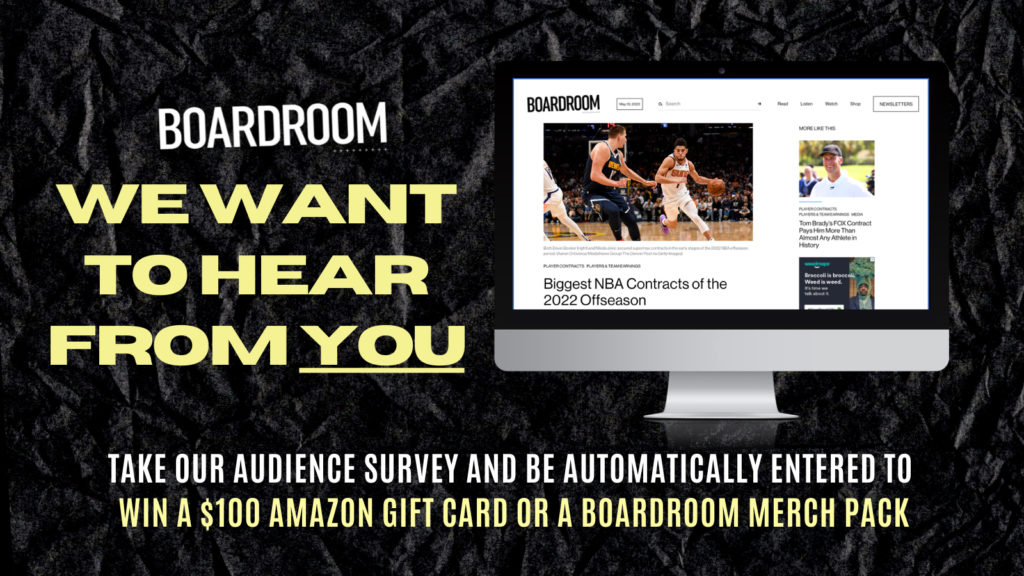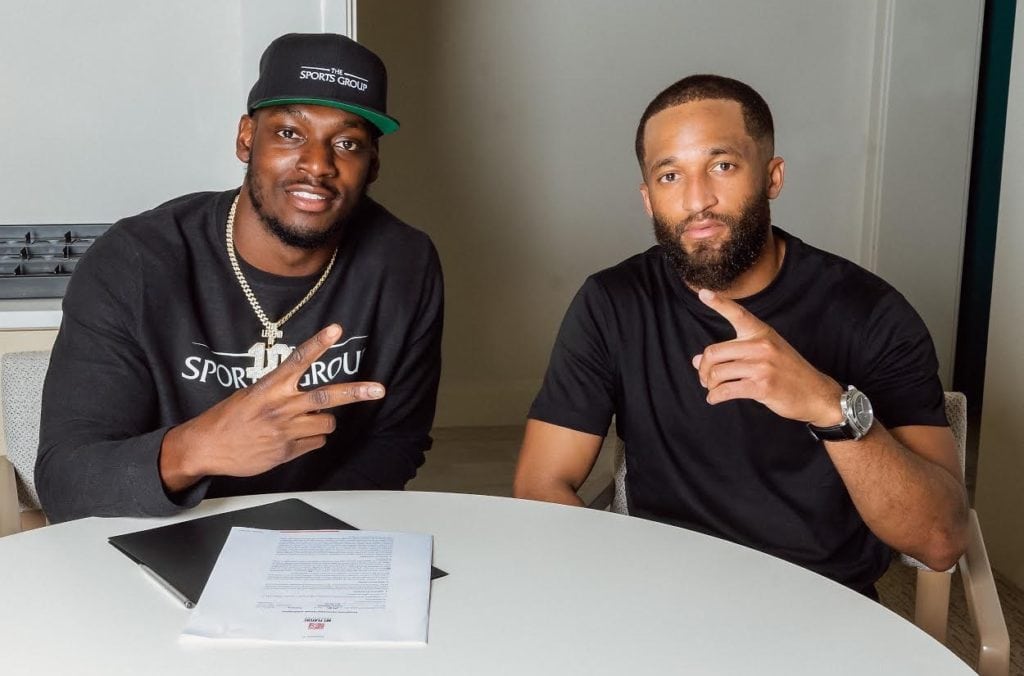EJ Scott is newly 30 years old, but he has already made a name for himself as an NFL agent. He spoke with Boardroom about his background and his process.
There are times when EJ Scott lives out of his suitcase. The 30-year-old NFL agent calls New York home, but sometimes that’s easy for him to forget — particularly in the months before NFL Draft season.
Ultimately, he feels it pays off in the relationships he builds and the deals he brokers. One success story he likes to bring up is undrafted free agent David Anenih, a defensive end out of Houston.
Scott brought him on as a client with The Sports Group, the agency he founded, and helped him secure a $730,000 deal with the Tennessee Titans. Such a salary hardly makes waves in the NFL, but it’s a personal success for Scott. He prides himself on identifying talent, connecting with them, and keeping open lines of communication throughout the process. That $730,000 ended up being the most for any of the Titans’ undrafted rookies this year.

He’s also had experience on the other end of the spectrum. In 2020, he helped Kevin Johnson sign a $6 million deal with the Cleveland Browns. That made Scott the youngest agent ever to negotiate a veteran contract during NFL free agency.
Yes, there are bigger names in the agent world. Yes, there are far bigger salaries. But it’s impossible to ignore what Scott is building. At an age by which the former Wake Forest Demon Deacon is still young enough to be playing himself, he’s managing deals for his peers and, if he wants, still has decades ahead of him in the agent game.
Boardroom recently spoke with Scott about his background and his budding career.
RUSSELL STEINBERG: I want to start with your background. Take me through the journey that you took to the point where you decided that you want to do this for your career.
EJ SCOTT: A lot of people right out of school would kind of say, hey, you’d be good in that field. [The idea of being an agent] was always interesting to me when I was in school. I just wanted to explore that. So, I started back in graduate school. I was a fifth-year grad transfer from Wake Forest, [and] I remember thinking, what else can I get into? I was always observant, just to see how things work. When I graduated, I got into it where I was going down to the Combine, Senior Bowl, and all those things, and then, working under a few different companies. I got certified in 2019, and then in 2020, I launched my own [agency] and did my first contract in March of that year right at the start of the pandemic.
RS: The pandemic obviously changed a lot of things for a lot of people. What have you been up to since 2020?

ES: Yes, 2020, that was my first deal. In 2021, Randy Ramsey joined the firm. He signed with the Packers this past March. And then it’s a rookie class, it’s one contract with the Dallas Cowboys, and then the Tennessee Titans. I had the highest guaranteed salary of the undrafted rookie class. So I’m going through that process where there’s a lot of work, a lot of traveling. I felt like I’m living out of my suitcase, but I wouldn’t trade it for anything else in the world — just going to the East-West Shrine game and Las Vegas and traveling to different training facilities, back and forth. Being there every step of the way for the guys is a great, great thing. You really develop those relationships.
Then you get back to recruiting for college. So now interviewing at different schools, I’ve been checking in with guys before training camp. I’m actually in the car flying back — I’m in Miami now, and I was just checking in, just making sure everyone is geared up for training camp. It’s going to be an exciting year.
RS: What made you want to go out on your own and start your own agency?
ES: It was really just looking at the landscape and where everything’s going. At 27, you’re just looking at the new CBA and where stuff’s gonna be 10 years from now. At my age, I said, Why not start now? The NFL is the biggest market. It’s definitely not going anywhere, so why don’t you set this up? It’s a long play here.
RS: So now that you have The Sports Group, what are you responsible for as the leading guy?
ES: I do everything like securing marketing deals, negotiating contracts, and doing the client servicing — just setting up training, housing, rentals, the whole nine for guys in the pre-draft process, and then taking care of everything.
RS: It’s got to be daunting, particularly at your age, to strike out on your own like that. What what was that process like?
ES: It’s definitely different when it’s your own brand and it’s your company. I just got right into it. I know the people I sit in front of. They know I can relate to them, and it’s just a great, great thing. So once I got certified, I said why not just go out on my own? I thought that would be the best thing to do. I started with blind faith and never looked back. Moving to New York was probably the first step after I did my first deal. I knew I would be expanding, and just preparing for all that, the last year has been great. So, I know [clients] would come in, visit, everyone enjoys New York City, so it’s been great.
RS: When you’re representing somebody, you’re handling some pretty big numbers, so trust has to be key in your relationship with your clients. How do you go about building that? How do you make sure they’re comfortable with you representing them?
ES: Just keeping them in the loop. I think it’s communication. That’s the biggest part, being transparent. Keeping things small— small numbers of guys you represent, you always have that communication up to date with everything that they have going on and vice versa. You have to have that active dialogue, that constant dialogue, which I found that players love and prefer. I always wanted to set up something where I’d be able to always pick up the phone. Guys are always in the loop with what’s going on. You can explain this and that, whereas, with a larger firm and a bigger model, [something may] get lost in translation.
There’s always a level of comfort that I have with my guys. In the draft process, starting in December around holiday time, guys going to all-star games, training, doing interviews with teams, just communicating constantly during those periods, so when it’s time for a contract in April, it’s smooth sailing.
I think just developing that dialogue is really how the trust is built. And just to add to that, when guys are chasing their dreams and you have that dialogue, you might know someone for a short period of time, but the amount of communication, that sort of thing kind of brings you closer to people in such a short period of time.

RS: You’d mentioned a contract with David Anenih of the Titan Titans. Using that as an example, can you take me through what the process is like in securing a contract for an undrafted free agent?
ES: With rookie contracts, if you’re drafted, you’re automatically slotted, but after the draft, there’s so many guys [left to fill out] the football team. You could be involved with the great undrafted stories there. So you have teams call and everyone’s calling the phone at one time, and you have to narrow down and pick, where do where you want to go? What’s the best fit? And you also, [you have to be] very quick to negotiate the terms and get things done. So that was definitely a good brush, but once the dust settles, you look back, you’re happier, you’re at a great place.
RS: Have you felt your your age is put you at either an advantage or a disadvantage in your work?
ES: An advantage from a player standpoint, for sure. Just because comparatively at my age, that’s old for the NFL. So these are all young guys — 21, 22. I guess I might be young to some, but I’m old to them. So it is an interesting dynamic from maybe the outside, but inside of it, it helps me because I can relate to guys. I get to know what’s going on and can help.
RS: What about your peers in the industry? Have you ever felt a lack of respect there?
ES: No, I haven’t felt that at all.
RS: I don’t know if you’ve even had the opportunity to experience this yet, but now that we’re in the NIL era and you work with rookies, do you think that the players coming into the NFL now are a little bit more prepared or a little bit more savvy than in the past and in terms of the financial aspect?
ES: Of course, yes. You have to pay attention to it. And I think just having access to information, I think it’s a lot easier now than it was probably 10, especially 20 years ago, but I think everyone is more privy to what’s going on contract-wise and seeing contract details and having access to that so quickly where it’s always something on the ticker. So I think everyone from players to fans, it’s just always a big interest. It’s definitely great to see how much attention the industry has gotten in the last five years and especially over the last two.
RS: What are some of the biggest challenges that that you faced since you started the Sports Group?
ES: Just taking the leap of faith and just wanting to keep building this with quality individuals and folks on good relationships, and I’m just excited for what what’s ahead. I know it’s an unpredictable world and definitely an unpredictable field. You just got to be ready for whatever comes your way.